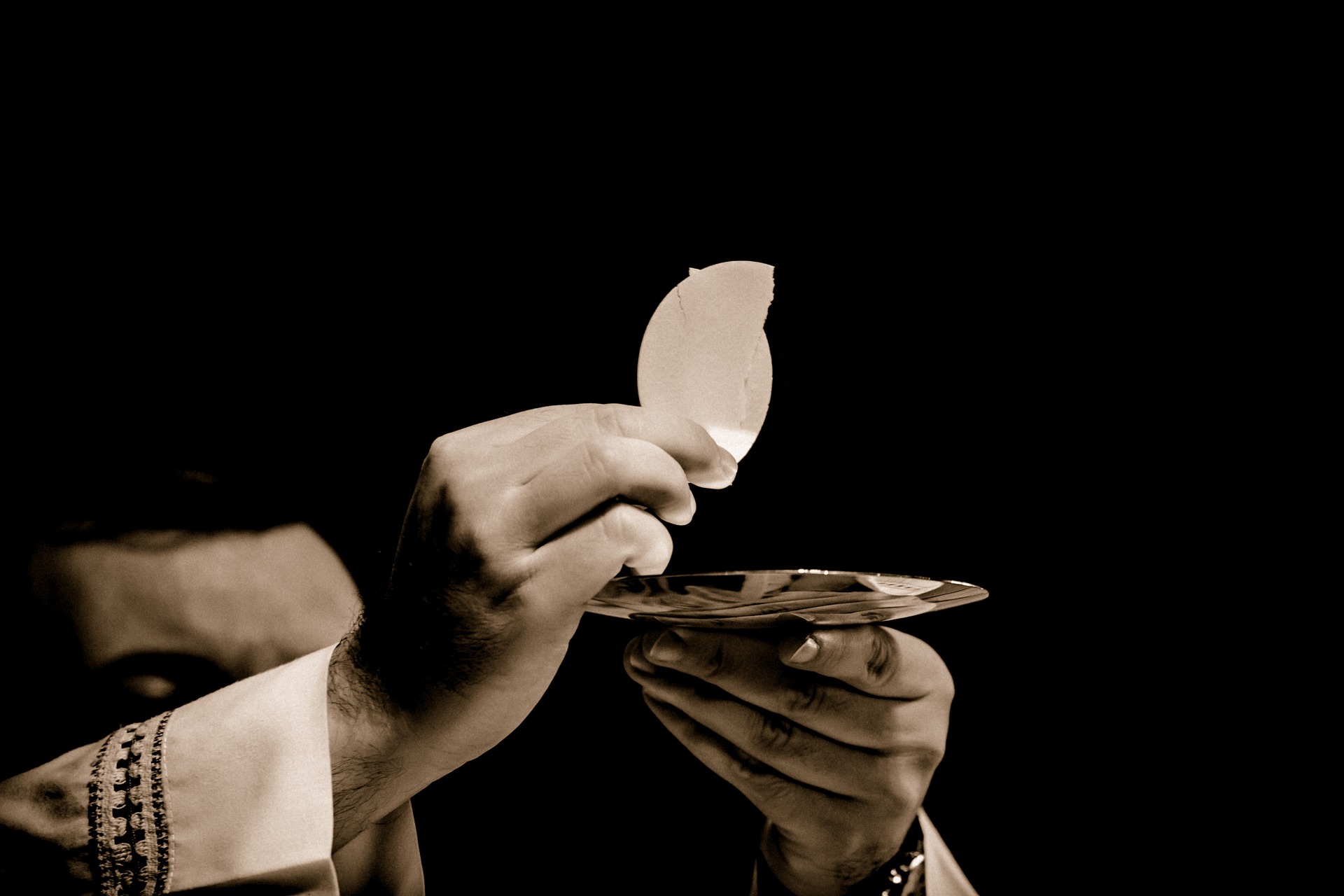Sacrament of the Eucharist and who consecrates
The Holy Eucharist is consecrated bread made from pure wheat and wine made from vine grapes that once taken, blessed, broken and given; becomes the body and blood of Jesus Christ our Lord. Through the Eucharist the holiness of God presents itself before humanity in a unique way as everything associated with Him is blessed and holy. Only a duly ordained priest using official prayers is permitted to consecrate the Eucharist. The prayer of consecration instantly transforms bread and wine into the Body and Blood of Jesus Christ. The place where Holy Mass is celebrated ought to be orderly and respectful to be deemed a worthy place for worship.
Who believes that the Eucharist is truly a Sacrament?
All Christian denominations recognize the importance of the Eucharist though they differ about its meaning. Instead; Catholics believe that when bread and wine are consecrated by a priest during Holy Mass they become the body and blood of Jesus Christ. Although bread and wine physically remain the same, they are transformed beyond human comprehension into the body, blood of Jesus which is called Transubstantiation. The Eucharist is a mystery of faith.
Faith takes the believer where science is unable
After consecration, bread and wine remain visible but the substance is completely transformed into Jesus. The Church refers to this supernatural process as Transubstantiation. This transformation takes place during the Holy Mass as the priest is invoking the prayer of consecration. The mode of Christ’s presence under the Eucharistic species is unique because it is a mystery of faith. In the most Blessed Sacrament of the Eucharist, Jesus is truly and substantially present. This presence is called ‘real’. Christ who is both God and man makes himself wholly and entirely present in the Eucharist. Vatican Council II in the Dogmatic Constitution on the Church refers to the Eucharist as the source from which all the Church’s activity originates and the summit toward which all the Church’s activity is directed.
What are the effects of receiving Holy Communion?
Benefits of receiving the Body and Blood of Christ are amazing. Receiving the Eucharist turns one into Christ’s bearer. The love of Christ becomes visible. What bodily food and drink produce in our corporeal life like nutrition, tranquility, healing and satisfying; likewise the Eucharist for our spiritual life. Holy Communion gives one supernatural strength to resist concupiscence and reinforces our free will to withstand the assaults of the devil.
What does the Eucharist do in us?
Holy Communion grants grace, vitalizes urge for supernatural things, strengthens virtues and replenishes gifts of the Holy Spirit, cures spiritual and physical diseases, cleanses the body and burnishes temporal punishment. Holy Communion gives us spiritual joy when serving Christ and humanity. When we partake the Holy Eucharist we grow in zeal for eternal life.
The Eucharist is the summit of Christian life
The Eucharist truly is the central Sacrament and the end to which all sacraments tend. This truth refreshes out the reality that each of the other Sacraments we participate in rolls us in the right direction. All the other sacraments starting with Baptism, Penance, Holy Communion, Confirmation, Matrimony, Holy Orders and Anointing of the sick serve the greater purpose which is leading humanity to full participation in the heavenly banquet.
What do most Christians concede about the Holy Eucharist?
Incidentally most Christian groups tend to perceive biblical teachings on the Eucharist as merely symbolic yet it is Jesus who states: “I am the living bread which came down from heaven; if anyone eats of this bread, he will live forever; and the bread which I shall give is my flesh for the life of the world” John 6:48. The principle grace of receiving Jesus through Holy Communion is that indelible personal union with God. Through Holy Communion we preserve; increase and renew life of grace received at Baptism. Just as the body needs material food to stay health and alive, so too does our soul need spiritual food in the Eucharist. The Eucharist is a pledge of future glory where love is all that matters.
Prerequisites for receiving Holy Communion
When we receive Holy Communion with right dispositions we generate fruits that are easily noticed over time. Holy Communion assists us to overcome prejudices while increasing in us compassion and self-control. The reason is that “the bread that we break makes us become partakers of the body of the Lord. We though many, become one body” 1Corinthians 10:17. We receiving Holy Communion only when we deem ourselves ready and worthy of receiving Him. We have to be in a state of sanctifying grace; meaning, being free from mortal sin. As physical food cannot benefit a dead body, the same applies to Holy Communion. When we receive while in a state of mortal sin is as we are forcing to benefit a dead soul. Indeed, a person who knowingly receives Holy Communion while in the state of mortal sin adds on him/herself a new dimension of guilt. However when we receive Holy Eucharist in a state of grace we reap blessings.
Honoring the Blessed Sacrament
Since Jesus is truly and fully present in the Eucharist, it is commendable to practice devotional of worship of His presence. When a consecrated is exposed in a Holy Monstrance on the altar; then adoration is in progress. The Eucharist is primarily meant to be consumed by Christians in a state of grace, yet solemn veneration of the Eucharist is the most salutary and pious practice encouraged by saints. Adoration is open to anyone in search of Jesus for consolation, peace and tranquility. Eucharistic adoration can be seen as a response to Christ’s call to his disciples to “keep watch with me for one hour” Matthew 26:40. In the Holy Eucharist there is Jesus and Jesus is our Holy Eucharist.
Fr Paulino Mondo









